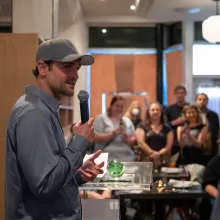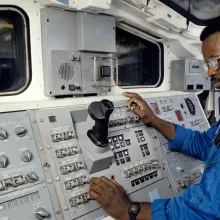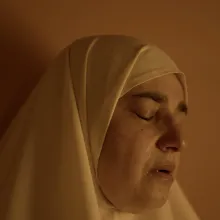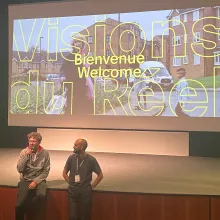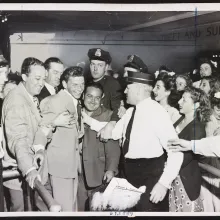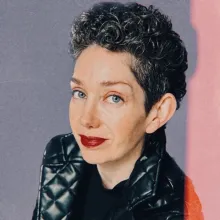Attending the Getting Real conference last year, I was inspired by Nanfu Wang’s keynote and Jessica Beshir’s and Payal Kapadia’s talks in the iconic “Here’s What Really Happened” sessions. I felt a strong resonance with these three filmmakers, especially because of their honesty in revealing knowledge acquired through their own film journeys. There are many parallels between the issues they discussed and documentary filmmaking in my region of the world, Central America. Sometimes I feel that Central America is an incorporeal piece of land, contained between Belize and Panama, floating in the
Latest Posts
Documentary is happy to debut an exclusive clip from Irene Lusztig's Richland ahead of its premiere in the Documentary Competition at Tribeca 2023 this weekend. This scene is filmed during the 75th anniversary of the Hanford Site, which the New York Times affirmed "is the largest and most contaminated" of all former nuclear weapons production sites in a feature article from last week. As part of the weekslong celebration, the nearby city of Richland, Washington, restaged Atomic Frontier Day, an annual nuclear pride parade event held from the 1940s through 1960 that included a parade, military
After conferring the inaugural Vanguard Award to Jessica Devaney in 2022, Doc10 selected Oscar-winning producer Shane Boris as this year's recipient for "documentary producers and filmmakers who are at the forefront of creating and cultivating innovative and important documentary filmmaking." Earlier this year, Boris was nominated twice for the Academy Award for Best Documentary as a producer of both Daniel Roher's Navalny (the winner) and Sara Dosa's Fire of Love, and was first nominated in 2020 for Petra Costa's The Edge of Democracy. At an awards ceremony on the evening of Saturday, May 6
A Conversation With Jamie Shor and Sky Sitney Washington, DC, is getting its newest documentary showcase with the launch of DC/DOX Film Festival, which will run June 15–18, 2023. Described on its website as bringing together “innovative visions, bold voices, and truth seekers in celebration of documentary cinema,” the festival’s full slate includes 31 doc features and 21 shorts showing at seven venues throughout the District. The heavy-hitter slate is composed mostly of well-received films coming off world premieres at Sundance, Berlinale, SXSW, True/False, and the nearly contemporaneous
Communication Workers of America Local 9003 (CWA) and International Documentary Association (IDA) are proud to announce that we have reached a tentative agreement on our groundbreaking Collective Bargaining Agreement for Documentary Workers United (DWU). We are aiming to ratify our 2-year contract in the next 45 days.
Secure in its June slot, and without the gravitational balance of the Tribeca Film Institute’s artist support and funding programs, Tribeca Festival’s traditional coziness with corporate sponsors has proliferated in recent years (and surely must also be pandemic-related). The film selections mostly reflect this unfortunate industry-wide trend. But between the celebrity- and music-driven biodocs that stuff Tribeca’s lineup, the festival also boasts stateside premieres of hotly anticipated creative documentaries, exciting debuts from independent filmmakers, and one of the best-curated film festival immersive sections in the world. For this recommendations list, we pulled together a mix of nonfiction projects that we’re anticipating will become the festival’s discoveries.
A chance conversation with a friend in London about how we missed attending documentary film festivals resulted—some weeks and intensive planning later—in my visiting a completely new country for me: Switzerland, to attend the celebrated Visions du Réel festival, which takes place annually in Nyon, a charming town just outside of Geneva. Celebrating its 54th edition, Visions du Réel’s maturity as a festival was evident everywhere, from the ubiquitous branding throughout the town to the packed venues, which featured a healthy combination of locals and visiting filmmakers. Most people we met had
We who live in the Washington DC area have access to the world’s largest rights-free collections of film and photos, and they are usually available to view within minutes. With ongoing library digitization projects and searchable databases, you may assume that you, sitting at your computers around the world, also have access to this material for your documentary films. The secret is the institutions that hold them don’t tell you that only a tiny fraction of these treasures are available online. After more than 30 years of working with these collections and hundreds of archival research credits
Heather Tanning, Senior Manager of Regional Marketing, is a 20-year veteran of intellectual property licensing at Getty Images, a preeminent global visual content creator and marketplace. Heather held positions at Getty Images in the research and licensing divisions prior to leading the film and TV production licensing strategy, which led to the creation of a dedicated licensing team for film and TV content creators devoted to strengthening Getty Images’ relationship with the documentary community. Heather is a graduate of NYU’s Tisch School of the Arts with a BFA in film and television
Mia Stewart’s upcoming 15-plus-years-in-the-making documentary, Searching for Onoda, deflates the heroic myth of Japanese holdout soldier Hiroo Onoda and tells the other side of the story. Both Arthur Harari’s 2021 Cannes-premiering narrative feature, 'Onoda: 10,000 Nights in the Jungle,' and Werner Herzog's debut 2022 novel, 'The Twilight World,' perpetuate the old myth.


